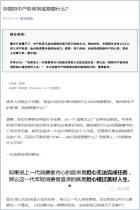
“Funereal Culture” Is Visible Everywhere
Is This Another Instance of a Youth Subculture Going Against the Mainstream?
Read or listen offline
Amazon KindleRecommendation
A curious culture with a strange name has taken hold of a subset of China’s millennials: “丧 sàng culture.” Sàng is the Chinese character that can mean funeral, ill fortune or a feeling of depression. In this context, sàng describes a culture of lethargy and self-loathing. Blogger Liang Xin, who runs a WeChat channel called Culture Industry Commentary, discusses where the trend is visible, how it emerged and how brand managers commercialize it. He shows that sàng culture is not unique to China. Similar cultures have developed in Korea, and Western memes and cartoons project comparable messages. Liang, a member of the post-90s generation, also gives his take on what may be at the heart of sàng culture. getAbstract recommends this article to young professionals, people working in marketing and branding, and anyone interested in social trends or pop culture.
Summary
About the Author
Liang Xin writes for the WeChat channel Culture Industry Commentary, which features observations and analysis of developments in China’s culture industry.




















Comment on this summary or Start Discussion